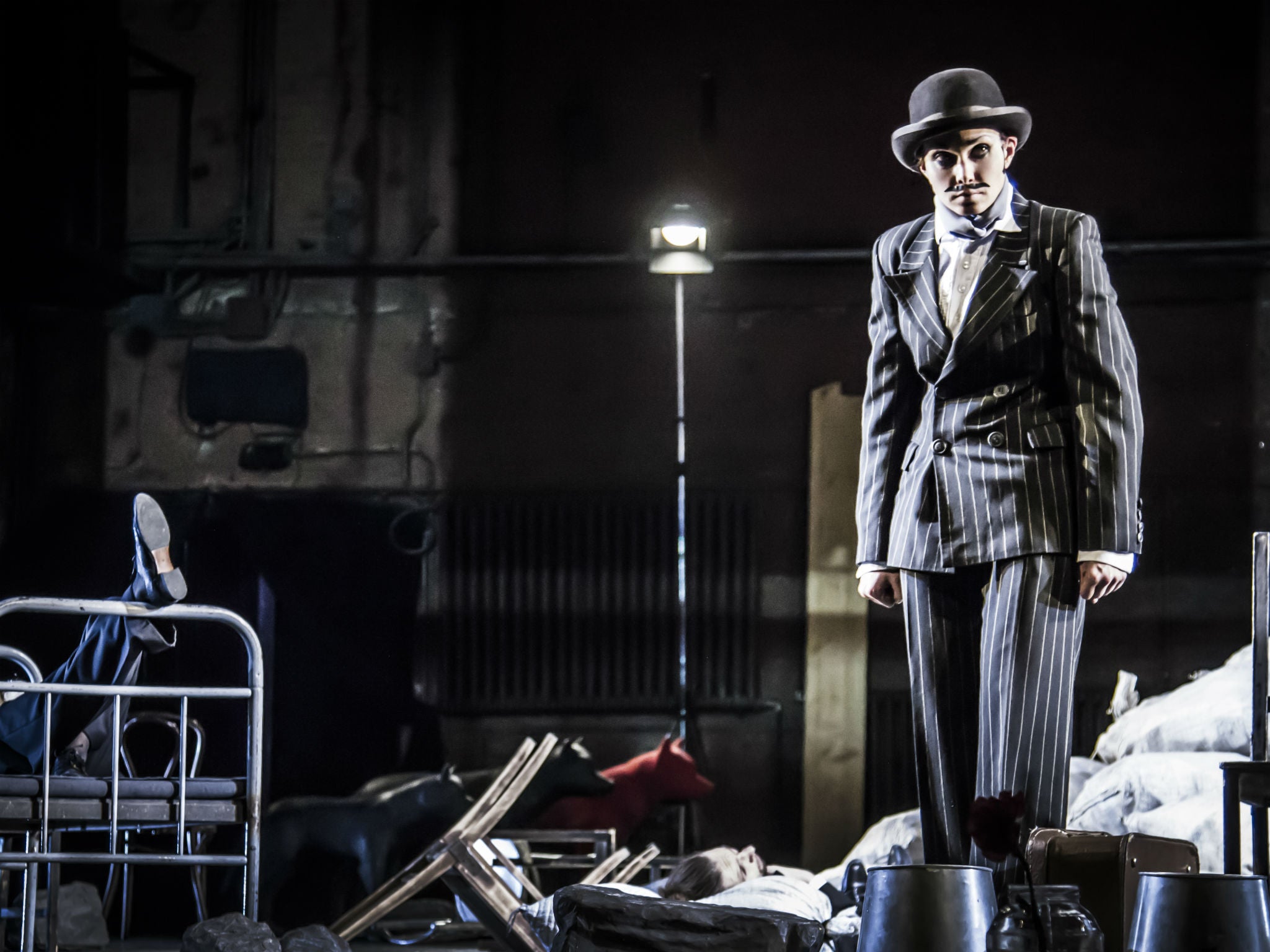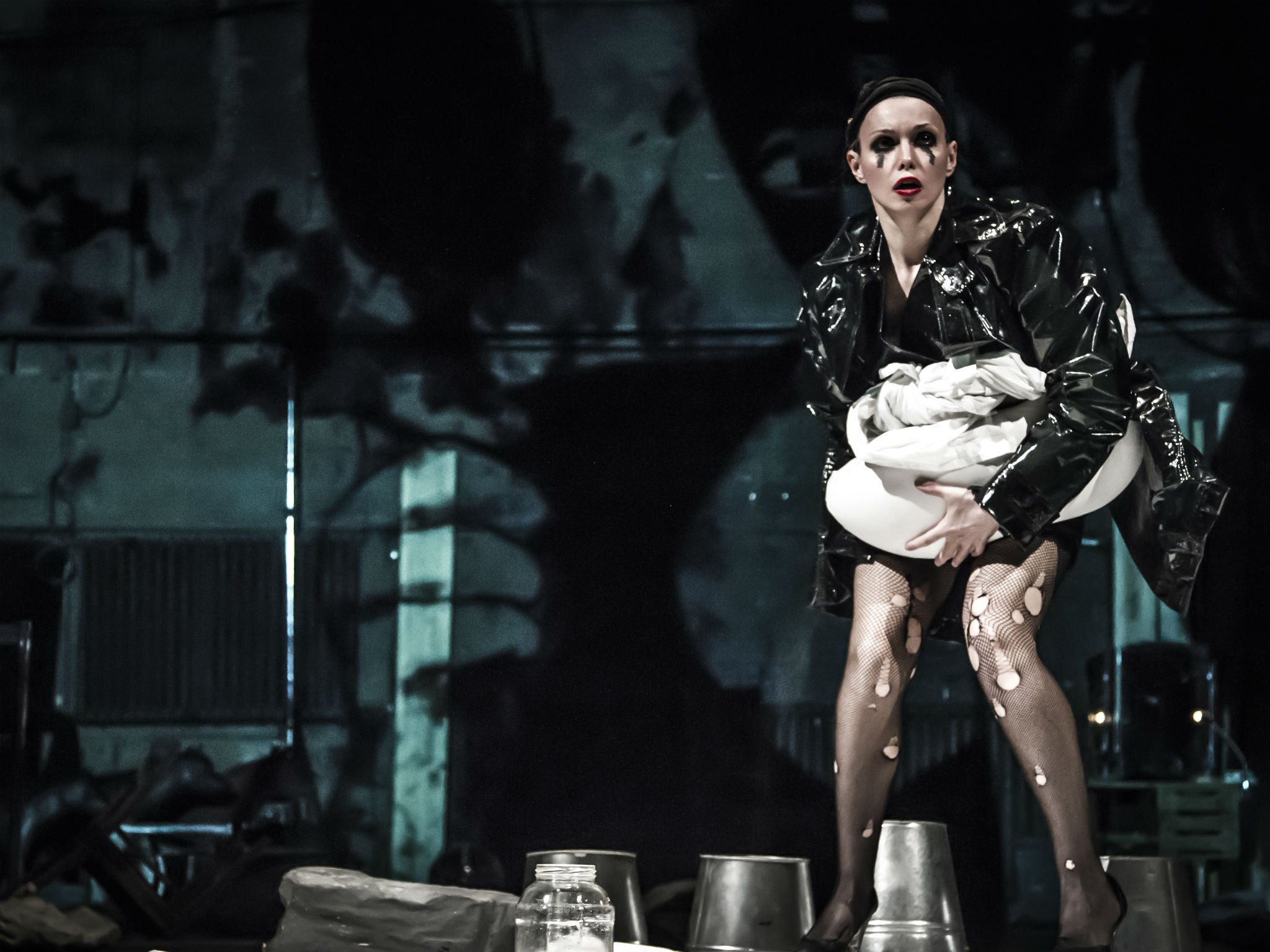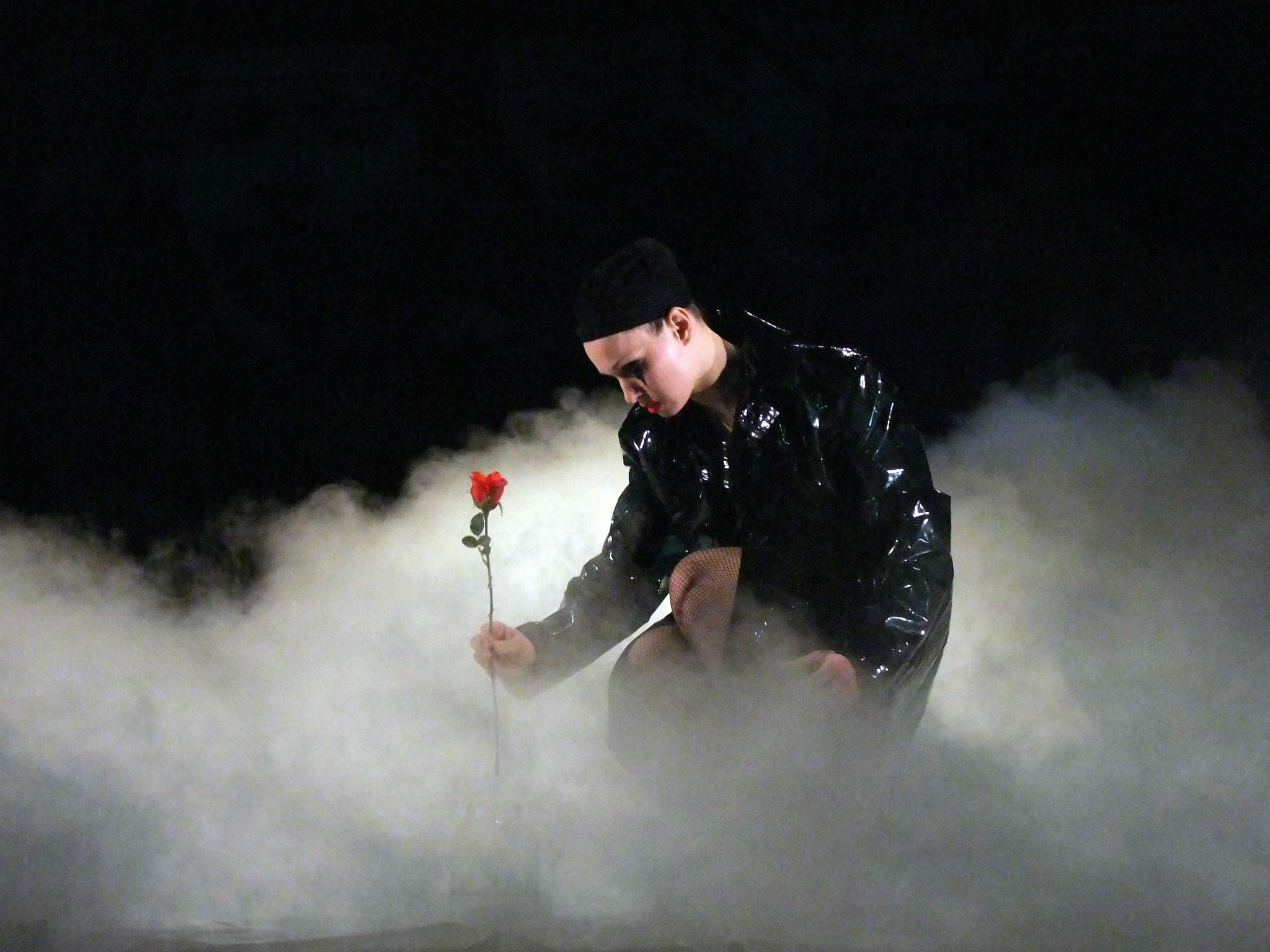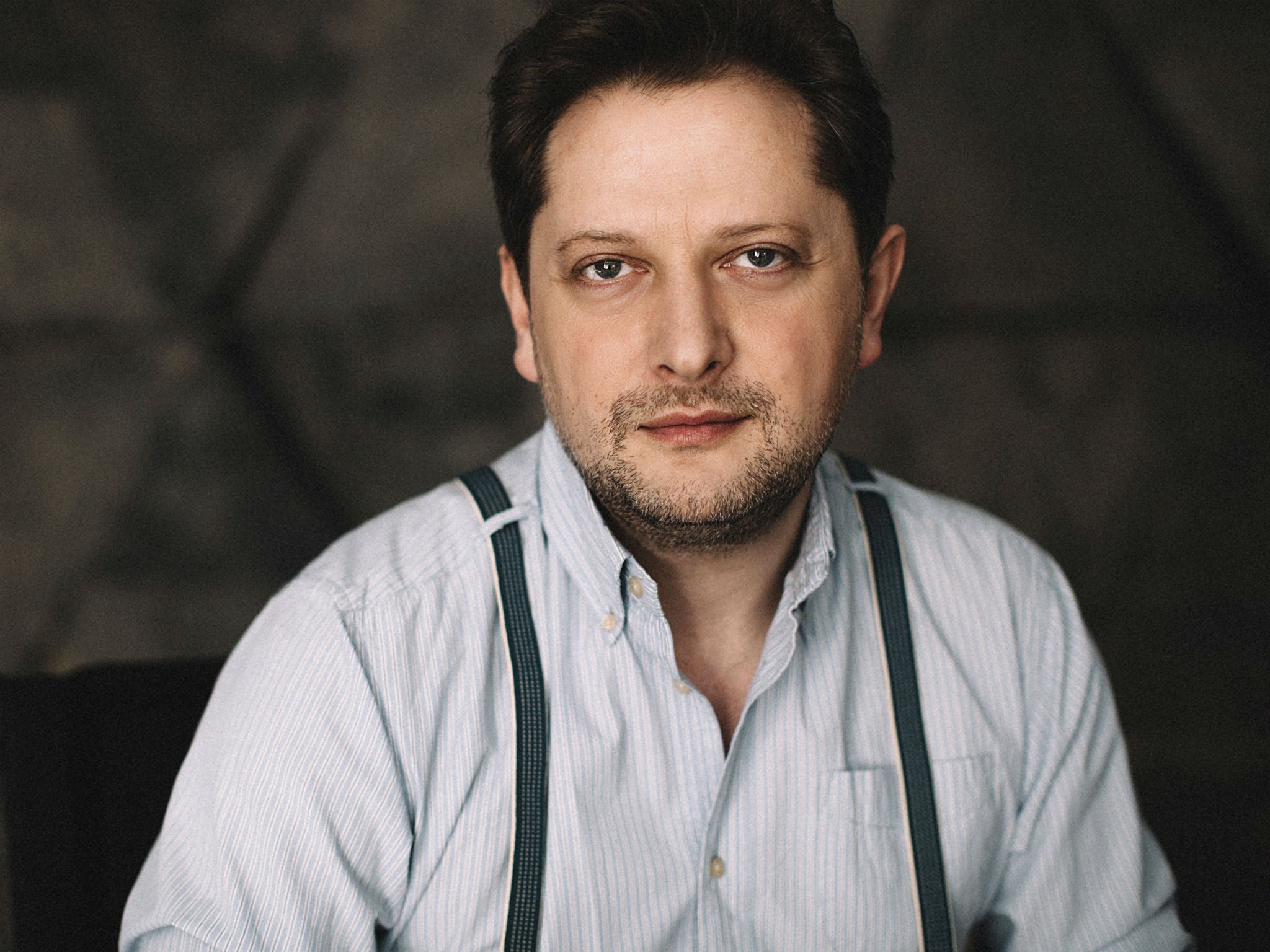Pushkin Theatre are bringing a scorching Brecht play to Britain. But first, they had to lay to rest some Soviet ghosts
Holly Williams travelled to Moscow to discover the troubled history of the theatre, and how it’s discovering a fresh sense of purpose with productions like ‘The Good Person of Szechwan’

Your support helps us to tell the story
From reproductive rights to climate change to Big Tech, The Independent is on the ground when the story is developing. Whether it's investigating the financials of Elon Musk's pro-Trump PAC or producing our latest documentary, 'The A Word', which shines a light on the American women fighting for reproductive rights, we know how important it is to parse out the facts from the messaging.
At such a critical moment in US history, we need reporters on the ground. Your donation allows us to keep sending journalists to speak to both sides of the story.
The Independent is trusted by Americans across the entire political spectrum. And unlike many other quality news outlets, we choose not to lock Americans out of our reporting and analysis with paywalls. We believe quality journalism should be available to everyone, paid for by those who can afford it.
Your support makes all the difference.When Roman Abramovich saw Moscow Pushkin Drama Theatre’s production of The Good Person of Szechwan in Russia, he knew by the interval that he wanted to bring it to London.
“So I said – well, wait till the end!” recalls their artistic director Evgeny Pisarev with a smile. And well he might smile: he knew the second half of the production of Bertolt Brecht’s classic, directed with blazing vision by Russian director Yury Butusov, was even stronger than the first. Now, the show is indeed about to arrive in London: it plays at the Barbican as part of a mini-season of work by the Pushkin Theatre, alongside a radical take on Chekhov’s The Cherry Orchard and a stage version of Chinghiz Aitmatov’s story Mother’s Field.
Recent years have seen several Russian companies bringing productions to the UK – and while Pushkin Theatre’s Cherry Orchard is a striking work, London audiences have become accustomed to the idea that Russian productions aren’t necessarily all birch trees, samovars and parasols. But politically agitating work by a German playwright? Less expected – especially when championed (and part funded) by a Russian billionaire.
But The Good Person really is thrilling. Stylishly directed and ferociously performed, it’s been a huge hit in Moscow since it opened in 2013 (the Russian system is to have around 20 works playing in repertory for years), and features a scorching central performance from Alexandra Ursulyak that has catapulted her to fame.

Brecht’s parable is a howl against inequality, revealing the impossibility of being “good” in this world of uncaring capitalism we have created. The gods come to earth and meet Shen Te, a poor prostitute who offers them shelter; they reward her with enough money to open a small tobacconist. But as freeloaders pile in, Shen Te finds her money slipping away. Unable to help everyone else without becoming destitute herself, she invents a hardnosed businessman uncle Shui Ta. Dressing up as a man, she takes on this role that enables her to be as tough as she needs to be in order to survive.
When The Good Person opened, Pisarev was nervous. He’d never signed up for Brecht. The much in-demand Butusov had originally suggested doing Dostoevsky’s The Idiot: a nice safe choice.
“Yury is a very unpredictable director,” Pisarev says, speaking through a translator, during lunch at Cafe Pushkin (the branding in this corner of the capital is nothing if not consistent). “So when he came up to me two weeks later and said it’s going to be Bertolt Brecht, I got a little frightened... with no [famous] actor, it was quite risky.”
He pauses, and smiles again: “Now I thank god that we cancelled The Idiot!”
At the premiere of The Good Person, Pisarev realised that “this was the most modern thing you could imagine on stage now”. It’s presented crisply, with Shen Te’s poor neighbours looking more like slick business fat cats in sharp suits.
And Butusov doesn’t sugarcoat anything: Ursulyak is never your sweetly cliched prostitute with a heart of gold; she is tough and raggedy from the off, in her smeared makeup and PVC raincoat. When we first see her disguised as Shui Ta – neat in pinstripes and a bowler hat, reminiscent of Charlie Chaplin – it’s funny, a performative sendup of masculinity.
But by the end, as the Shui Ta character takes over, Ursulyak gives a terrifyingly intense performance: she is ravaged by the selfishness of those around her, but also overwhelmed by the impossibility of squaring her own survival with the hypocritical standards of “goodness” demanded by the gods. She stamps and rages, singing the hardhitting Brechtian songs (still in the original German) with such ferocity that her voice becomes hoarse.
You might assume this exploration of gender is the reason to do this play now – The Good Person could be about how power, and therefore money, still works along gendered lines. But for Butusov, it has more to do with the male and female, tenderness and toughness, within all of us.

“Me and maestro understood that this passage between the male character and the female character does not actually exist,” says Ursulyak when we talk at the theatre before the show. Shen Te and Shui Ta are one and the same.
And yes, she really does call her director “maestro” – a small detail, but one which makes it perhaps less surprising that Russian theatre isn’t yet using this play as a way to unpick structural gendered power imbalances.
But how does a play like this change when you perform it for so many years? For Butusov, the political situation in Russia and beyond has become more extreme since 2013, making Brecht’s work even more potent. “We’re living in a very selfish time,” he says.
While speaking to key figures in Russia’s arts scene, of course you want to know the extent to which their work may or may not be constrained by their own political situation. After all, theatre director Kirill Serebrennikov was placed under house arrest in 2017, accused of fraud, though his defenders claimed it was politically motivated.
Artists don’t have complete liberty, Butusov acknowledges candidly, although the risk is as much of self-censorship as dramatic public arrests. While Butusov has never had any of his work “prohibited or forbidden”, he has felt pressure in previous roles.
“Different methods may be used for causing this pressure upon the director – it’s almost never direct pressure, saying that one can’t approach some topic, it’s more an administrative pressure,” he says. For instance, it may be implied the sort of work they want to make has no audience, and therefore is not economically viable.
In fact, Butusov’s productions are reaching ever larger audiences; he recently became head of Moscow’s avant garde Vakhtangov theatre company. And his presence at the Pushkin theatre was part of Pisarev’s very deliberate attempt to reinvent his own company.
Pisarev took over the theatre in 2010, after the previous artistic director Roman Kozak passed away. “It’s located in the heart of Moscow, but what was happening inside was actually quite provincial,” he recalls. And while Pisarev has kept some productions – not least a version of Beauty and the Beast which has been running for an astonishing 68 years – he was also determined to shake things up. Today, he can confidently say that “the Pushkin theatre is a theatre which is capable of surprise”.
Butusov agrees: “If we think of the theatre as it was before, it may be called a ‘theatre with a beard’,” he jokes. Now, he adds approvingly, Pisarev focuses his attention on the younger generation.

But before he could start making such inventive work, Pisarev had to lay to rest a few ghosts in the theatre. Quite literally: the Pushkin was believed to be haunted.
Founded in 1914 by Alexander Tairov, and then called the Chamber Theatre, it originally formed a Russian home for foreign work, from Brecht’s The Threepenny Opera and Eugene O’Neill’s plays to even the worldwide premiere of JB Priestley’s An Inspector Calls. They also toured successfully around Europe, and were popular with audiences far beyond Russia. But then, during Stalin’s rule, such an outward-looking European attitude became dangerous.
“Tairov was killed, artistically,” says Pisarev. “They took away his theatre, its name was changed, they fired his acting company. At once, he got brain cancer; he kept waking up and going to the theatre and they would not let him in. He would stand in front of it for hours...”
His wife Alisa Koonen, an actor in the company, lived for 25 years after Tairov’s death – but never went on stage again. “There is a legend that when she died, she sent a curse to the theatre,” said Pisarev. He was even warned against taking the job on by colleagues muttering about the bad luck the theatre has endured ever since – how many of its artistic directors have died “in strange situations”.
Pisarev doesn’t believe in ghosts, but nonetheless he decided to hold a special gala, honouring the contributions of Tairov and Koonen and asking their forgiveness.
Since then, the theatre’s fortunes have indeed improved. And their arrival in London once again gives The Pushkin Theatre a chance to show groundbreaking work to audiences far from home. Koonen, surely, would approve.
Moscow Pushkin Drama Theatre is at the Barbican 5 to 9 February; barbican.org.uk
Join our commenting forum
Join thought-provoking conversations, follow other Independent readers and see their replies
Comments